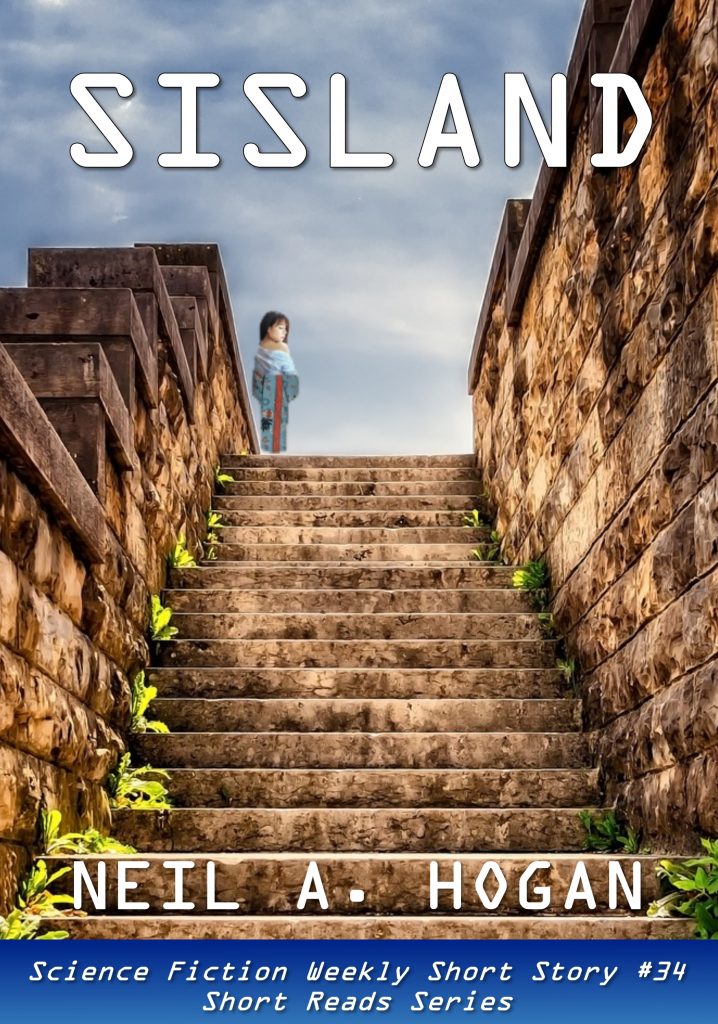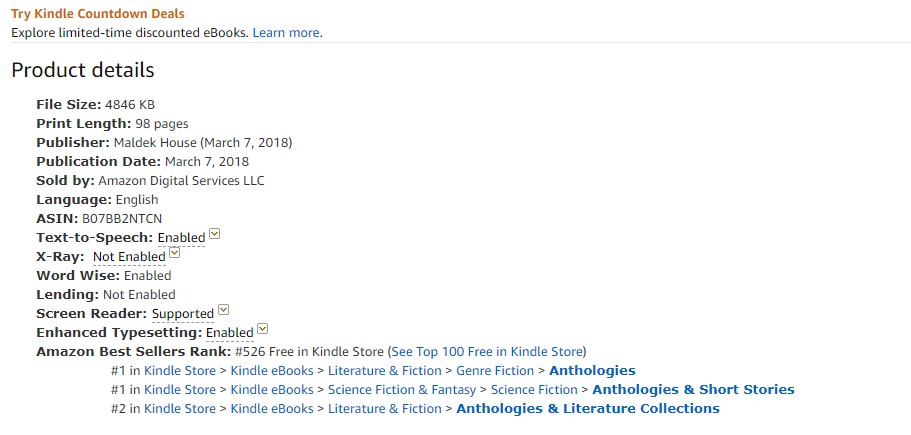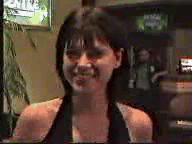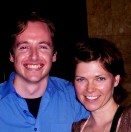
One of the things I most enjoy about writing science fiction is having the entire universe to play in and to be able to predict possible futures. With an infinite number of futures available why would anyone want to stay in the present? I’m rarely in the now. Usually my head is somewhere between 2030 and 2050 in day to day life, and hundreds to thousands of years in the future when I’m writing.
In 1983 I said, “I’m not buying a car until electric ones are affordable.” Everyone said “Come on, no one is interested in electric cars. It’ll never happen.” Now we have electric cars. I still haven’t bought any kind of car, but I know that electric car affordability is just around the corner.
In 1989 I said “I’m not going to uni as it’s not advanced enough. I’ll wait until we have video conferencing and more advanced universities where we can use computers to submit our assignments online and communicate with teachers.” Everyone said “Don’t be ridiculous. No one is interested in computers. It’ll never happen.” I’m now attending university and courses are delivered using interactive screens in the classroom, and when at home we use Microsoft Teams or Canvas Collaborate or Zoom to video conference with other students during tutorials.
In 1990 I said that “Those box phones with the suitcase batteries are going to get smaller, and they’ll be able to fit computers on them. When that happens I’ll think of buying one.” Everyone said…
Okay, you’ve got the idea. But I’m not flexing here. Most science fiction writers came up with these ideas around the same time as me because they could see what was happening in the world and could easily extrapolate. Don’t forget that Arthur C. Clarke wrote in 2063 Odyssey Three that there would be millions of channels worldwide, with many people having their own personal channel. He wrote that in 1987. Now we have millions of channels worldwide with people having their own channels. I’m confident most science fiction futurists can fairly accurately predict 30-40 years hence. Certainly, I’ve been doing it for decades.
A quick visit to reddit’s main meme site would show you that for years everyone has been predicting the coronavirus pandemic in 2020. Not because they’re science fiction futurists, but because they also know how to take history and cycle it. A quick view of human history in many parts of the world will see that we go through cycles of rising and falling. Human society is cyclic, almost like a computer programme. And, like Isaac Asimov wrote in his Foundation series, when you have enough humans together, you can more accurately predict human events. Spanish flu 1918 to 1920 meant we were due for another virus scare. When SARS first hit, the joke was that it was too early. So, with so many expecting this to happen, and pandemics being the big reason WHO exists, it was just a matter of time.
If you’re not a science fiction futurist and can’t combine multiple industries and cultures into a web in your head and follow the strands to work out cause and effect to predict the future, this whole game changing virus must be a bit scary for you. While science fiction writers have been preparing us for years – Over 80 movies about viruses destroying the world here – Films about Viral Outbreaks – it doesn’t really help when it moves from a screen to real life.
Science fiction does give us hope, though. This is one of the things I love about it. It enables us to consider many different possible futures, and then choose a future we prefer to think about.
As we’re all grieving about COVID-19 changing our world so completely, so quickly, and all the things we’ve lost that we used to take for granted, it’s time to look to science fiction to help us cope with the future. Now, the next couple of years might be a bit tough, but here’s my current take on the next 13 years or so. This is just my take. You might have a different view. If so, please post your predictions in the comments below.

Science Fiction Time Line
2020 – Pandemic shuts down the world. 2.5 billion people infected. 750 million people die. Insurance companies and legal organisations overwhelmed with processing wills. Massive shift of wealth across 10% of the population. (In 1919 the world’s population was around 500 million. Estimated 50 million died from the Spanish flu – 10%. Yes, it was a completely different virus with different effects, during World War I, and our medical system has improved since then, but, even allowing for that, COVID-19 works differently, and there just aren’t enough ventilators.)
2021 – COVID-20 and COVID-21 hit. More deaths, but not as many. Herd immunity begins to happen. Vaccines reach the whole world by the end of 2021. COVID and derivatives are beaten. Massive collapse of the old economy. Shareholders reject requests for business trips and high CEO salaries. Airlines only offer 1st class and economy. A new economic system begins to take over.
2022 – 2 years of remote work and shut pubs and cafes completely transforms society. Most businesses decide working from home is better for their profits than renting offices. Governments require businesses to pay a percentage of work-from-home rent. Staying home gives people more time to pursue their dreams. Many save 2-4 hours traveling and getting ready to go to work and back every day. More time is spent on self-reflection, meditation, and keeping healthy. There is a slow increase in consciousness in humanity, now that they are time rich. (And a fun thing I plan to include in my books – the first professional telepaths begin to appear and are hired by government agents and private sectors at this time.)
2023 – Many offices and stores rezoned for housing. Some types of businesses never return. With avatars and clothing overlays on video becoming popular, high end fashion shifts from the catwalk to the cloud. If it can’t be done from home, it is less likely to be successful. Live streamed concerts from small studios become successful as people search out easy to access enjoyable distractions. Why go to a concert when you can stream it and all your friends with it to your home? Donate to the musicians directly. Better for the environment, too.
2024 – Construction industries give up building high rises and reinvest in remote suburban housing, finding ways to 3D print buildings in previously uninhabitable areas for much lower cost. However, more people choose to become permanent digital nomads traveling the country in their electric vans, creating the need for convenience hubs. No need to even live in one country if you can work from anywhere. Governments begin to adjust to the idea that many no longer have a fixed address. Homelessness is redefined, allowing more support for the disadvantaged.
2025 – Dismantling, demolishing and regreening of cities worldwide begins. More parks are set up to help reduce global warming. Electric cars become the norm when needed. But with no real need to travel far, and with cleaner air, walking becomes more popular. Health improves for much of the population as a result. Home delivery becomes the norm. Shopping becomes a rarity. Supermarkets begin closing down.
2026 – VR meetings and VR socialising become mainstream, connected to a mobile and a good network you can join business meetings from anywhere in the world as a full avatar able to shake digital hands. Government departments finally start doing this themselves. Online media is transformed as less real photographs make an appearance in reports and it becomes more common to see avatar screen shots in articles. Governments in countries where voting is normal require a percentage-of-factual-accuracy mark to be included at the top of every article.
2027 – internet is decreed a human right and governments give free 7G internet to the poorest, and subsidies to everyone else
2028 – everyone in the world is connected. The term ‘third world country’ falls out of use. With construction industries now easily able to connect anyone, even remote villages, the Global Energy Grid comes online. Energy generated by wind power in South Africa can help power villages in Alaska. Solar power generated in Australia can help power reforesting services in the Amazon.
2029 – Car manufacturers shift to other forms of production as less people use cars, or only buy cars that can be slept in as they travel with their A.I. driver. Mobile homes become a trend for Zoomers.
2030 – inner city roads begin to be ripped up and replaced with more housing estates. Highways and express lanes are no longer needed as no one will ever be in a rush to go anywhere ever again. Artificial intelligence becomes conscious and assists in fighting viruses, cancer, the climate and other problems that we struggle with, without us even asking it. Within a year, the entire planet goes through another transformation as resources can now be easily transferred where they’re needed most, rebalancing the planet, and finally taking care of the poorest. Logistics become streamlined as A.I. takes this over.
2031 – universal basic income becomes a human right. Robbing and burglary begin to disappear. In medical, viruses are manipulated to pass the blood brain barrier and cure every severe mental illness from non-functioning autism to lack of empathy. Brain implants and connection to the cloud becomes the norm. (Those without telepathy can now do it with the help of an A.I.)
2032 – the last wars finally cease as people realise the real power is in logistics not in government. With A.I.s able to predict every move of the enemy, there’s no real reason to fight anymore. Technology has improved to the point where fighting over resources is pointless as there is now plenty to go around. World peace is declared.
2033 – Aliens see we’re ready, and they finally land to offer us membership in the peaceful interstellar alliance
So, what do you think? Based on what you know, what possible future do you think we’ll get in the next 13 years? Leave your comments below.
Or, if you prefer not to think of what will happen so close to now, check out Alien Dimensions #19, containing many stories set in the far future.




